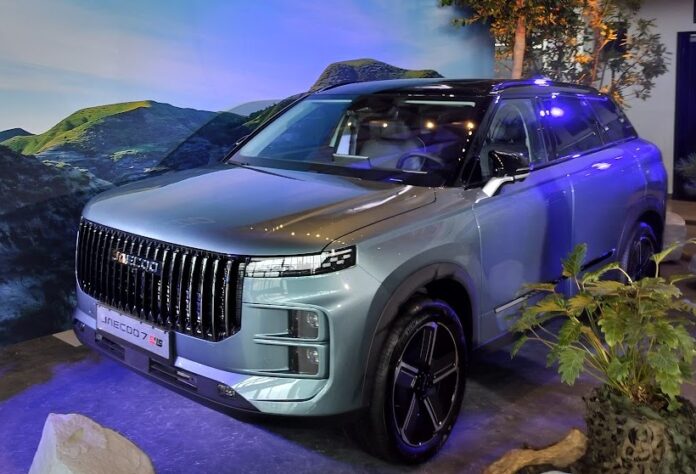In an interview with the German daily Die Welt, German CDU MEP Manfred Weber, who leads the EPP group in the European Parliament, has announced that his group will soon table a proposal to scrap legislation banning the sale of combustion engine cars and vans by 2035.
He stated: “The ideological mistakes of the last legislative period must be corrected.” (…) It is important that we secure jobs in the automotive industry and win over the workers.”
The EU legislation which requires a 100% reduction in CO2 emissions for new cars and vans by the middle of the next decade was decided in 2023. It effectively amounts to a ban on combustion engine cars, pushing the industry toward electric vehicles (EVs). This Summer, German car manufacturers came out very critically against the EU’s planned phase-out of combustion engines by 2035. This may have motivated Weber.
Jean-Paul van Oudheusden, automotive market analyst at trading platform eToro, explains to Dutch newspaper Trouw that their protest is connected to the increasing arrival of Chinese car brands on the EU market: “The Germans have been shocked. Chinese brands were present en masse and are presenting one model after another. (…) Almost all of them are fully electric or hybrid cars. (…) When they see the Chinese competition, they think: if we go all-electric at this pace, we are going to lose the race.”
The newspaper thereby adds that “new models from Chinese brands (…) are attracting European consumers with sleek-looking plug-in cars. They are equipped with the latest software and infotainment screens that cover half the dashboard. In terms of design, they are on a par with their European competitors.”
Manfred Weber ‘promises’ to reverse EU’s combustion engine ban https://t.co/IqFUKUsOq4 pic.twitter.com/wVM3YO5s26
— Euractiv (@Euractiv) September 13, 2025
The European Commission’s stance on its 2035 ban remains unclear
Weber’s fellow CDU colleague, European Commission President Ursula von der Leyen, seems to continue to take a different stance. During her State of the Union speech, she appeared to continue to support the EU’s 2035 ban, stressing: “no matter what, the future is electric”. At the same time, however, she explicitly endorsed “technology neutrality”. It is reportedly still unclear whether her European Commission will agree to support any measure to weaken the vehicle emission rules.
Notably, during her talk, von der Leyen proposed the so-called “new Small Affordable Cars initiative”, saying: “I believe Europe should have its own E-car. E for environmental – clean, efficient and lightweight. E for economical – affordable for people. E for European – built here in Europe, with European supply chains. Because we cannot let China and others conquer this market.” She stressed: “The future of cars – and the cars of the future – must be made in Europe.”
Since the announcement, scant details have been unveiled of this plan. It is one thing that the EU is imposing tariffs on Chinese vehicle imports, with Chinese subsidies as justification, but let’s hope that the European Commission doesn’t see itself as having a role in the production of cars, given the long running track record of this kind of central planning.
At the heart of the debate is whether very strict CO2 emission requirements that are limited to new cars are a sensible measure to protect the environment and public health through regulation. Ultimately, so many other factors are at play than CO2 emission, and the massive progress cars have been making over the cars in terms of safety, public health and environmental friendliness is undeniable. Very selective severe restrictions imposed from the top-down that practically support one specific technology are never a good idea.
Bloomberg’s clean transport correspondent Colin McKerracher, a proponent of EVs, explains why binding centrally imposed targets are not the best idea:
“Automotive product cycles are long, and certainty is needed to help backstop big investment decisions. But strict phase-outs may be very difficult to enforce or maintain as deadlines near. Past experiences with products like incandescent lightbulbs show that it takes a huge amount of political capital to fully ban a consumer product that’s already in the market.”
Auto makers now stress the importance of “technological neutrality”, thereby arguing that biofuels — made with plant matter — and e-fuels — synthetic fuels made with renewable energy and captured CO2 — are cleaner than traditional fossil fuels.
Why don’t we let a thousands flowers bloom, and give every alternative a fair chance to compete? It is very well possible that EVs may indeed win that race, as von der Leyen thinks. They do hold great promise and are absolutely welcome. One of the German car manufacturers that criticized the 2035 ban release electric vehicles actually did so during the presentation of a new EV model.
Instead of u-turning, the EU Commission is doubling down on its failed 2035 Electric Vehicle mandate
"The EU Commission is working on a plan to prohibit car-rental firms & large corporations from buying non-electric vehicles for their fleets from 2030"https://t.co/h7Ek4DRuqw
— Pieter Cleppe (@pietercleppe) July 21, 2025
More and more Chinese EVs are entering the EU market
As mentioned, an important element in this debate is the enormous success of Chinese electric vehicles. Chinese EV producers continue to expand in Europe. This week in Amsterdam, Chinese car brands Omoda and Jaecoo – produced by Chery Automobile – were released on the Dutch market. “The Netherlands is not just the next step in our European expansion, but a crucial market when it comes to sustainable policy, electrified mobility and design-conscious customers.” said Jeff Zhang (picture), Vice President and CEO for the EU of parent company Chery Automobile.
With prices starting from around 37.000 euro for an SUV, it can be understood that competing European car companies are rather worried. More than 17 million customers in 120 countries already drive a car from the Chery group. With 5 million exports, the company has now been China’s largest car exporter for 22 years already. The company disposes over 14,000 engineers and eight R&D centres worldwide, including one in Germany. Zhang thereby points out that European consumers are leading the way in product development, saying:
“In Europe, for Europe – this is reflected, for example, in our joint venture with Ebro-EV Motors for a factory in Barcelona.”

The market share of Chinese car brands in Europe has nearly doubled in the first half of 2025, in comparison to the same period in 2024, as the sales of American EV producer Tesla have declined. Despite this, it still remains at just over 5%, Jato Dynamics estimates.
In any case, in China, the EV market is booming, thanks to comparatively cheap production costs for things like battery cells. According to estimates, by the end of 2025, China’s EV sales will overtake total US vehicle sales of all types, which includes gasoline, hybrid and battery electric. In China, the growth of EVs has been much stronger than in Europe or the U.S. over the last decade.
We're a year into the EV slowdown narrative. Where do things actually stand?
Heading for just under 17 million EV sales this year, a new record. Growth rate will be about 20%, down from 33% the previous year. pic.twitter.com/BeCGSIja53
— Colin Mckerracher (@colinmckerrache) October 18, 2024
Challenges ahead
Notably in this regard is that China, like the U.S., and unlike the EU, does not have a centrally imposed phase out target for combustion engine cars, and yet more than half of car sales in the country are battery-electric and plug-in hybrid vehicles.
In the first eight months of 2025, 4.3 million vehicles were exported from China, including 1.5 million EVs. That is up from less than 1 million for all of 2020. The Financial Times notes that this clearly signifies “a shift for an industry long dominated by Europe, Japan and the US.” Hopeful for EVs is also that in many developing countries, EV sales are soaring, partly due to increased hurdles for Chinese EVs in Europe and the U.S. Naturally, we still will need to see how everything will play out, but consumers, not policy makers, should and will decide this.
These Chinese EV Makers Will Never Be Profitable
you hear this a lot, FT today shows what's up:
profitable: BYD, GEELY, GWM, SAIC, SERES, Changan, Li Auto, LEAPMOTOR 🇨🇳
soon?
Haima, JAC, XPENG, BAIC, GAC (?), NIO (?)
⚡️⚡️⚡️#alwaysbecharging pic.twitter.com/AV3KZ4NFcJ— Felix Hamer • electricfelix (@electricfelix) September 15, 2025
Certain Chinese EVs only cost around 15.000 euro in China. Obviously, any market is different, and one cannot simply assume that this would be the price in the EU, but imposing barriers here will not benefit European consumers. Then the European Commission seems to give in to protectionist sentiment. Instead of responding by changing overly zealous EU regulations, like the 2035 ban, European Commission President von der Leyen appears to prefer a protectionist approach, with her talk about “European” cars, mirroring the failed French “industrial policy” model, not to speak about the tariffs on Chinese EV imports. Protectionism by trading partners does not justify imposing even more trading barriers.
Introducing central planning at home is an even worse idea. If the EU Commission’s “new Small Affordable Cars initiative” is EU-funded, it may actually deliver cheaper cars, but consumers will see part of the price show up in their tax bills. Surely that can’t be the idea.
If one thing is a "disaster", it's French industrial policy:
– Plan Calcul (1966-1975): Honeywell buying up most of the would-be champions
– Plan 3T: create a European consumer electronics industry
– New video standard (V2000) https://t.co/KfW48F0KLahttps://t.co/PxXCP9r1z2— Pieter Cleppe (@pietercleppe) October 24, 2019













